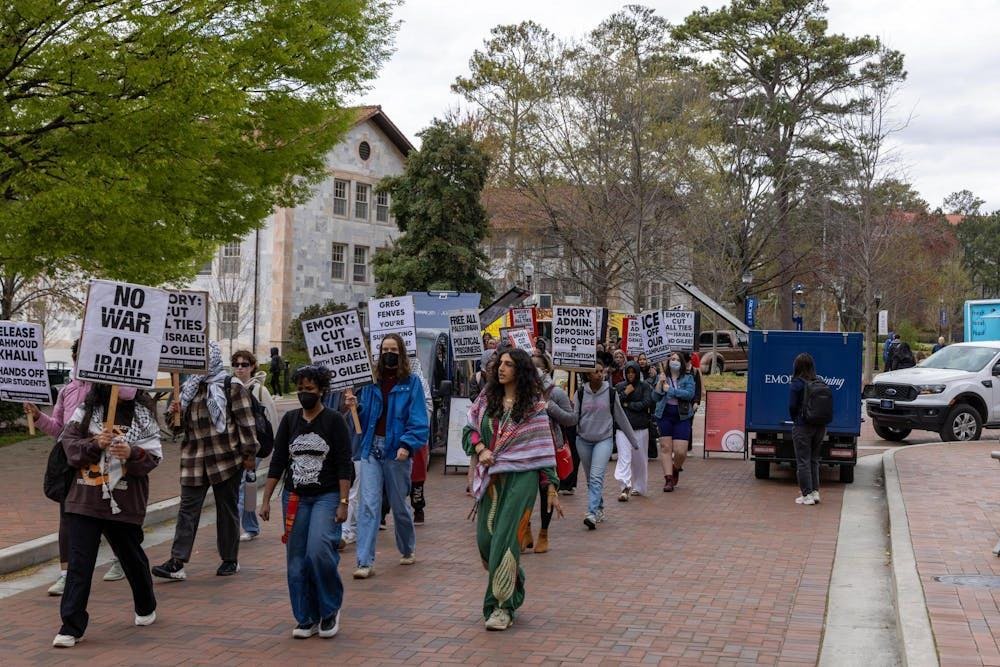The plague of visa cancellations finally descended upon our campus. As Emory University students finished a day of classes on April 10, our phones lit up with an email notification reading “SEVIS terminations at Emory.” We skimmed the email to discover that U.S. Immigration and Customs Enforcement (ICE) had terminated the visa records of an Emory student as well as three alumni. In the past few weeks, ICE has targeted about 800 foreign college students across the United States through arrests, attempted deportations and visa terminations, especially those who have expressed pro-Palestinian beliefs. This persecution is horrifying — perhaps horrifying enough to scare students away from supporting Palestine or criticizing the Trump administration. To protect controversial political speech and our peers’ rights, we must continue to voice dissent instead of giving in to fear.
The horror show began on March 8 when ICE agents arrested Mahmoud Khalil, a permanent U.S. resident with a green card, for leading pro-Palestinian demonstrations last spring while he was a student at Columbia University (N.Y.). U.S. President Donald Trump orchestrated the attempt to deport Khalil — not for any criminal charge, but for his political expression. Secretary of State Marco Rubio stretched an obscure Cold War-era law to claim the power of deporting any immigrant whose presence “would have potentially serious adverse foreign policy consequences.”
By labeling Khalil’s activism as antisemitic, the Trump administration claims his speech counteracts the policy of combating worldwide antisemitism. Applied broadly, this line of reasoning is absurd. “Ensuring economic and energy security,” for example, is an explicit objective of the U.S. State Department. Under Trump’s interpretation, simply condemning government-backed oil pipelines could become a deportable offense. Trump’s persecution applies even to occasional participants in pro-Palestinian protests, such as Yunseo Chung, another Columbia student active in grassroots engagement like attaching fliers to trees. Deporting residents for political speech stabs at the heart of democracy, flouting basic First Amendment and due process rights.
The Trump administration has already set a chilling precedent of punishing political speech. Columbia has been investigating dozens of “students who have expressed criticism of Israel,” including Maryam Alwan, a senior who advocated for divestment from Israel in an op-ed. ICE detained Tufts University (Mass.) student Rumeysa Ozturk, who co-authored an essay calling for Tufts to “acknowledge the Palestinian genocide.” I wonder whether I, too, could be targeted for this op-ed condemning Trump’s witch hunt. Students now face seemingly absurd yet entirely legitimate fears of retaliation for even modest forms of political expression. The Trump administration’s calculated use of vagueness perpetuates these fears, especially because students deprived of their visas are often left in the dark as to why they must leave the country. This ambiguity creates a chilling effect as anti-Trump and pro-Palestinian students silence themselves amid uncertainty.
For all these reasons, it is even more extraordinary when students stand unwavering in their support of political expression. On March 20, dozens of Emory University students protested in support of Palestine and against Khalil’s detainment, demanding “ICE off our campuses” and calling upon the federal government to “free Mahmoud Khalil now!” Emory students could have remained silent, giving in to the Trump administration’s Red Scare-style purge, but they did not. They spoke up. Seeing my peers unwilling to concede to repression was reassuring and inspiring, as it exhibited the courage we, as students, are ready to display in these dark times.
The times have only darkened since Khalil’s arrest. If Emory students ever believed we would be spared from Trump’s wrath, we must recognize that it is now destroying our own community — but also that we have countless methods of resistance at our disposal. We can host demonstrations. We can share information about U.S. immigrants’ rights. We can support our friends who fear they may be next on the chopping block. However, different positions call for different obligations. I especially empathize with my peers who could be in danger of losing immigration statuses or visas, as they are at the heart of the Trump administration’s crackdown. I cannot, in good faith, compel them into imperiling themselves. Dissent involves risk for everyone, but it is far more dangerous for some students than others — which is why those of us privileged enough to lack certain dangers carry the additional duty of speaking up for those who cannot.
My experience witnessing students’ continued dissent highlights its ripple effects, and I have faith that we at Emory will stand up for our peers. Dissent signals defiance to repressors of political speech and encourages initially apprehensive people to participate by creating a shared sense of community. Despite the growing risks of dissent — or rather, precisely because of the growing risks of dissent — we cannot muzzle ourselves. The very fact that Trump is targeting political speech makes it essential to safeguard and continue to express. Failure to uphold this principle would make it our fault, as much as Trump’s, that college campuses turn mute. Whether through loud demonstrations or intimate conversations, resist being self-imprisoned by fear and voice your dissent with pride.
Contact Selena Teng at selena.teng@emory.edu.

Selena Teng (she/her) (28C) is majoring in Philosophy, Politics, and Law. She is from Millburn, New Jersey and enjoys crochet, amateur Brazilian jiu-jitsu, and New York Times games.




![IMG_0064[31].jpeg](https://snworksceo.imgix.net/whl/bd1509fc-0fff-41c3-8a17-14169776d877.sized-1000x1000.jpg?ar=16%3A9&w=500&dpr=2&fit=crop&crop=faces)

